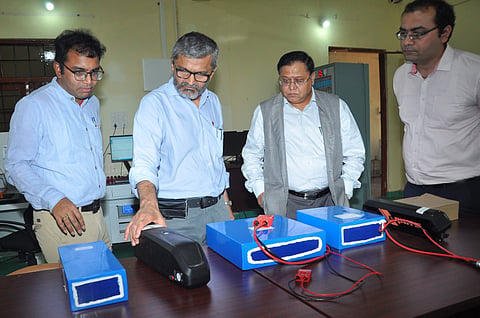

Did you know that our generation (the generation that is stil currently breathing ) is probably the last of the lot that is going to experience fuel-based vehicles. According to BP's Statistical review of World Energy, global oil reserves at the end of 2012 stood at 1.7 trillion barrels. Given that the world consumes about 86 million barrels of crude oil per day, it would be easy to conclude we'll run out of oil in 55 years.
While most would still ignore this fact and continue living in ignorance, two men who were college roommates at IIT Bombay — Nishanth Dongari and Rohit Vadera — decided to start their company Pure EV, that has four Indian-made, battery-powered e-vehicles (bikes) which will hit the market later this year. The start-up has bee incubated by IIT Hyderabad and their manufacturing facility is also situated in the City of Nizams. According to their website, the bikes are priced between Rs 32,999 and Rs 74,999.
They recently unveiled four models of two-wheelers that will run on portable high-performance lithium batteries, that can deliver an unbeatable cost of 5 paise per kilometre. They even have super-cool unconventional names that go with their unconventional designs. The four models are Egnite, ETrance, EPluto and Etron. The whole sight of the four models are definitely 'e-lectrifyng'. The only problem that people have with electric vehicles is that it can cost an arm and a leg, but Nishanth says that their products are "affordable", given how low the running costs are. Excerpts from a conversation:
Your models promise a fuel-efficiency of 5 paise per km. How do you anticipate the public will react?
We are still working on public confidence building. We are yet to launch our product in the market and there are a lot of questions that are flowing in regarding the range and power backup of our products. But, we do have a lot of interesting aspects to offer to the crowd such as a portable battery to carry around in case of an emergency. The battery can also be removed and charged at various power stations and the best part is these batteries can be charged with a three-pin plug on a regular socket that we use every day. Actually, that is not the best part, our affordable pricing strategies are what sets us apart from the rest.
Do you think electric vehicles are best suited to meet the needs of India?
There are a few companies who have begun productions of electric two-wheelers and most struggle with customer sales because their products lack speed and pick-up — which is pretty important in Indian traffic. These lithium batteries have been tested and approved to provide high performance and speed. Otherwise, you won't get to work on time.
People often worry that they may run out of charge while on the move. How often will the batteries have to be charged?
Overnight charging of a battery can last you a 100 km. But the added benefit is that these portable batteries can be charged anywhere. So for instance, if you drive 30 km a day to work, you still have enough battery to last you your trip back home and also while you are working you can charge your battery in case you are planning to go out after work.
Let's get real. Most people are used to faster, more hardy bikes for Indian roads. Can your e-bikes compare?
We gave out a few hundred sample models and had each aspect tested on different grounds. Like the batteries were tested, the wheels, brakes and shock absorbers were tested and so on. We also had the models, as a whole, tested. Based on the feedback we got we are trying to overcome constraints that each of these vehicles has. In about six months, we will have a model that's up and ready to face any kind of question the public has for us.
Walk me through how you and Rohit started off as roommates and ended up in IIT Hyderabad?
Rohit and I were roommates in IIT Bombay. We had this idea spark then and there itself. But somewhere along the line, we fell back on our lives and passions causing us to pursue different paths. When the economy slowly began favouring e-vehicles we decided to get back to it and start afresh. With the help of IIT Hyderabad and their R&D Incubation Cell we started our company in the year 2016 and in the year 2018 we began creating prototypes. In a span of six months this year we plan on launching our e-vehicles based on the feedback we have received.
